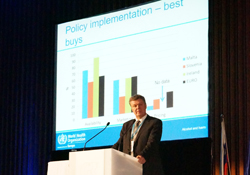European conference to discuss progress and challenges for alcohol policy

WHO
Researchers, representatives from nongovernmental organizations and policy-makers met in Ljubljana, Slovenia, on 21–23 November 2016 for the 7th European Alcohol Policy Conference. The theme of the conference was “Alcohol policy for sustainable development” and its focus was on sharing progress and discussing challenges ahead for alcohol policy. It was hosted by the Ministry of Health of Slovenia in collaboration with Eurocare (the European Alcohol Policy Alliance). In conjunction with the conference the Joint Action on Reducing Alcohol Related Harm (RARHA) and Alcohol Policy Network (APN) also organized satellite events, focusing on best practice and the role of industry in alcohol policy-making.
Several areas were particularly highlighted during the conference, including the need for more and better data on harm to others, monitoring, marketing, inequalities, labelling, how to work with non-state actors and, importantly, how to ensure that alcohol is high on the policy agenda and that health is indeed part of all policies.
Alcohol as part of the Sustainable Development Goals (SDGs)
The European Region still has the highest level of alcohol consumption of all the WHO regions. The SDGs provide a unique opportunity to ensure that alcohol is acknowledged as an important risk factor for premature mortality and disease, however, and make clear that preventing its harmful use will contribute to sustainable development and health across all Member States. Goal 3.5 specifically sets out to “strengthen the prevention and treatment of substance abuse, including narcotic drug abuse and harmful use of alcohol”.
WHO Regional Office for Europe launches Alcohol Policy Timeline Database
During the second day of the conference, the current situation in the WHO European Region and areas of future work were presented. The presentation included the launch of the Alcohol Policy Timeline Database, which provides information regarding policy developments in Member States. This is part of a three-year project entitled “Monitoring of national policies related to alcohol consumption and harm reduction (MOPAC)”, which aims to support collaboration between the European Union and WHO in the monitoring and surveillance of countries’ progress in reducing the harmful use of alcohol. The development of the Alcohol Policy Timeline database was carried out with funding from the European Union.
The 7th European Alcohol Policy Conference was co-funded by WHO and the Ministry of Health of the Russian Federation.



